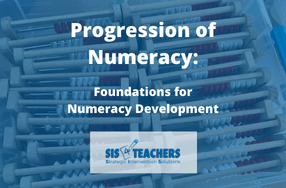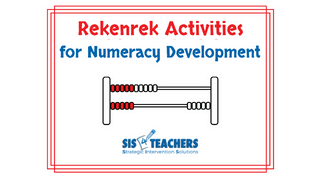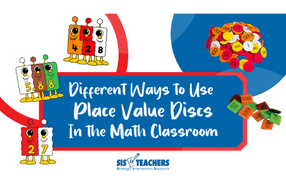The concept of Math Workshop changes the way math has looked in schools for the past 30 years.
When we talk about Math Workshop in classrooms, we are advocating to move away from teachers directing instruction and move towards students directing their own instruction. It flips the traditional model of control in the classroom, and leaves many of the responsibilities are up to the students.
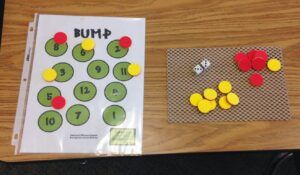 For example, in Math with Someone, teachers traditionally spend a lot of time putting out buckets for all the games with all the materials needed. If the students were going to play a game like Bump, you would gather the board and the dice, count out 10 of the red clear counters and 10 of the blue clear counters for each bucket. You would put the buckets at the center and hope and pray that, while you work with your guided math group, the other groups go to the Math with Someone center, play the game, and put the materials right back in the bucket so it’s all ready for the next group. In reality, teachers actually spend more time picking up the counters off the floor and actually resetting the game so it’s ready for the next student group to come and play.
For example, in Math with Someone, teachers traditionally spend a lot of time putting out buckets for all the games with all the materials needed. If the students were going to play a game like Bump, you would gather the board and the dice, count out 10 of the red clear counters and 10 of the blue clear counters for each bucket. You would put the buckets at the center and hope and pray that, while you work with your guided math group, the other groups go to the Math with Someone center, play the game, and put the materials right back in the bucket so it’s all ready for the next group. In reality, teachers actually spend more time picking up the counters off the floor and actually resetting the game so it’s ready for the next student group to come and play.
The big idea or goal of Math Workshop is building independence so kids can do things on their own. If you need another red counter, or if you are short something, you go to the Math Salad Bar and get what you need. In our workshops, as we talk about building independent learners, working towards inquiry-based instruction and turning more control of the learning over to students, the idea of entitlement comes up often. In our experience, this entitlement is not based on socio-economic status, but rather age. Today’s 21st Century kids are living lives of instant gratification. They don’t have to do a whole lot of work to access anything, and they think that if they’re seeking anything out, it should come towards them. Additionally, we have a lot of helicopter parents that are going to make sure that their child is successful.
We talk a lot about this idea in our Math Projects. Often, we (as a collective society), don’t let kids fail. We often want swoop in and save kids from impending failure and make sure that their math is correct. In actuality, if you let a kid fail and figure their way out of a problem or a task, that’s where they’re going to become strong. Kids today appeal to the teacher to take on the responsibility for their learning in math by showing them exactly what to do. However, we want to push the responsibility for learning back onto the students.
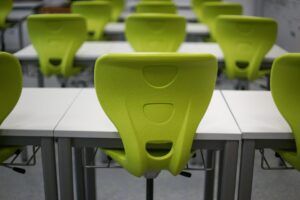
I was watching a Math Workshop in a 2nd grade classroom few months ago. The teacher had everything set for Math Workshop. She had one group go to her guided math table, get started on something, and she went around to make sure all the other stations were beginning as planned. I was observing the group at the guided math station, and I saw a boy standing there. He was one of six students in the group, where the previous group only had five students. I asked him if he was going to get started on what he was supposed to be doing in the Math with a Teacher station, and he responded, “Yeah…I don’t have a chair.” I looked him in the eyes, gave him the Teacher Pause (you know the one!), and said, “Hmm…ok. Let me know how that works out.” Then I walked away. The look on his face was almost disbelief at what had just happened. Of course, as teachers, we’re thinking, “JUST GET A CHAIR!!” (yes, in all caps). But, he’s standing there, waiting for someone to realize that poor Johnny doesn’t have a chair.
I’ve found that students generally aren’t proactive enough to think, “Oh, I should probably go get a chair since I don’t have one?” How many kids in your classroom have come to you and said, “Miss! Miss! I found this pencil on the floor!” No matter how many times you’ve been over your routines, you still have to say, “Well, what do you think you should do with it? Maybe you should put it back in the supply case for kids that don’t have a pencil?” Or maybe you get this one: “Um, Miss…I found a staple on the floor.” What do you say?? “Thanks for letting me know. But do you really need to let me know? Can you just throw it away?”
My daughter’s teacher shared this video with me, and it perfectly captures the attitude most learners have today.
We actually play this video for our students in the classrooms we work with. It’s funny to watch the students’ reactions at first. You can see them thinking, wondering what the people “stuck” on the escalator are going to do. By the end of the video, kids are yelling, “Why don’t they just get off the escalator!?!” That’s the whole idea!
Why don’t you just solve the problem instead of waiting for someone else to do it for you? Why don’t you just throw the staple away? When you don’t have enough counters for bump, what do you think you should do about it?
There’s so much interruption in our guided math groups with kids needing things. Math workshop is designed around helping students become independent learners because they realize that you’re not going to be there to help them at every turn. They’re in 1st grade, or 2nd grade, or whatever grade you teach, and they’re 100% capable of doing things for themselves. Some problems are easy to solve if you just take ownership and responsibility.
Try showing this video in your classroom. Talk about what they’re seeing. Why didn’t the people just get off the elevator? What kept them there? What were the people missing? Why didn’t they see the simple solution? Expose your students to this idea and establish personal responsibility as an expectation. Then, when someone holds up a newly-discovered pencil or observes that they don’t have a chair, you can simply respond by saying, “Just get off the escalator,” and turn and walk away. I often use Love and Logic language along with it and say something like, “Oh, what a bummer. Let me know how that works out,” and just walk away. Because the more we “swoop and save” and are quick to help students solve their problems, we’re supporting entitlement and the students’ lack of thought. You might even play this video for parents as you enlist them to help fight this “disease” of entitlement.
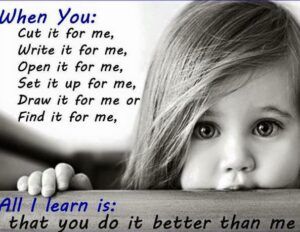
We need kids to really have a hard time solving little problems. The problems become bigger as kids get older. The choices they make in the future have the potential to be far more detrimental than the decisions they make today. So, let them struggle with the little problems, because problems become bigger as kids get older. If they’ve learned to struggle well, persevere, and solve problems when the consequences of a mistake are small, they’ll be better equipped to make quality choices when they are faced with problems that carry more serious consequences later on.

